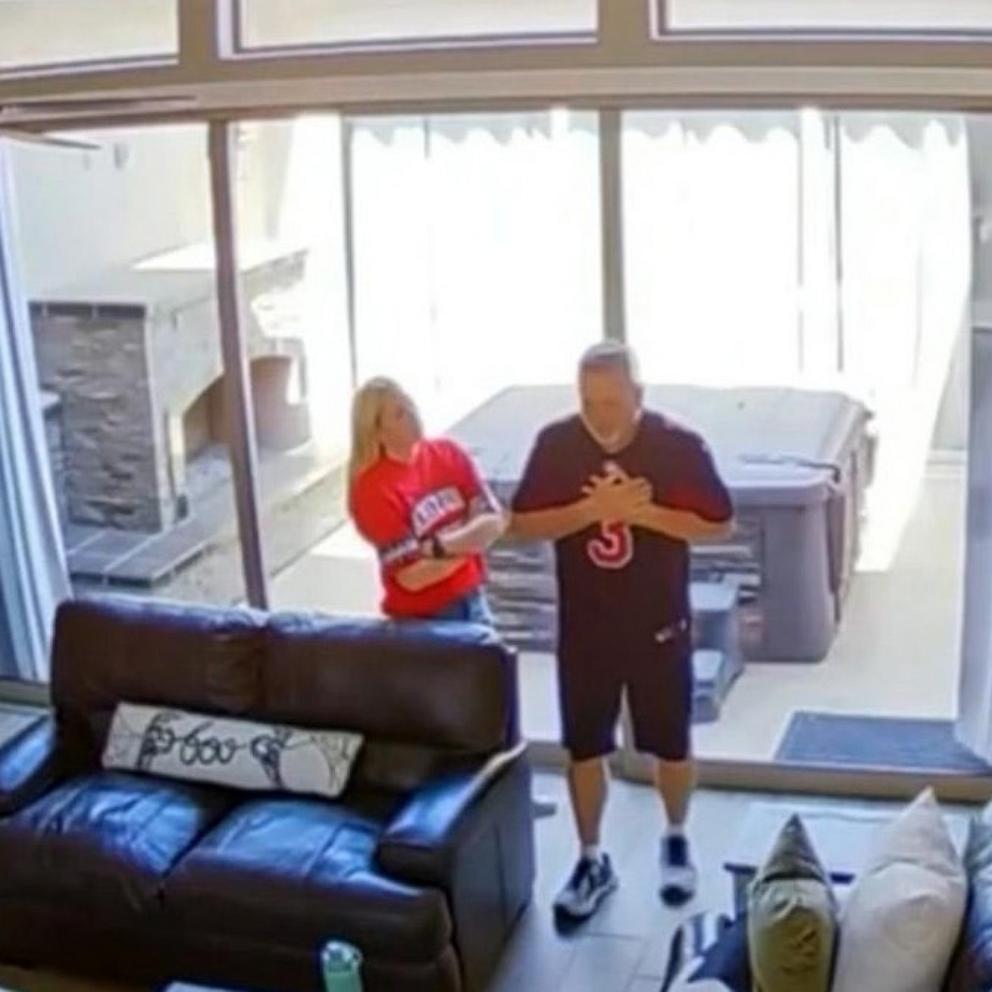Megachurch pastor, mental health advocate Jarrid Wilson dies by suicide
A popular megachurch pastor who was also an advocate for mental health died by suicide Monday, according to his family and church.
Jarrid Wilson, 30, was an associate pastor at Harvest Christian Fellowship in Riverside, California, and founder of Anthem of Hope, a Christian mental health organization.
Wilson's wife, Juli, with whom he founded Anthem of Hope, shared a video on Instagram of Wilson playing with one of their two sons at a baseball practice Monday night. Just hours later, she wrote in the video's caption, Wilson died.
In another Instagram post, she wrote to Wilson, "No more pain, my jerry, no more struggle. You are made complete and you are finally free. Suicide and depression fed you the worst lies, but you knew the truth of Jesus and I know you're by his side right this very second."
Harvest Christian Fellowship confirmed Wilson's death by suicide, writing in an Instagram post featuring a photo of a smiling Wilson that he took his own life.
"He was vibrant, positive, and was always serving and helping others," a church official wrote of Wilson. "Jarrid also repeatedly dealt with depression and was very open about his ongoing struggles. He wanted to especially help those who were dealing with suicidal thoughts."
"Over the years, I have found that people speak out about what they struggle with the most," the official wrote.
Wilson himself posted about suicide on the day that he died, writing a tweet that begins with the lines, "Loving Jesus doesn't always cure suicidal thoughts. Loving Jesus doesn't always cure depression."
Suicide is the 10th leading cause of death overall in the U.S. and the second leading cause of death among people in Wilson's age group, between the ages of 10 and 34, according to the Centers for Disease Control and Prevention (CDC).
The death of Wilson by suicide is particularly painful and relevant because he was someone people looked to as a mental health advocate, according to Nadine J. Kaslow, PhD, professor of psychiatry and behavioral sciences at Emory University School of Medicine in Atlanta.
"When we lose someone like this it devastates everyone and it's easy to say, 'Then what's the point?'," said Kaslow, who did not treat or know Wilson. "The point is we have to reach out to each other and connect more, provide more support to each other and do our best to get people help."
"There is help out there and it can make a difference," she said.
Kaslow points out that Wilson's death is a reminder that mental health affects "everyone and anyone," even those who are aware of their struggle and seek support and help.
"Even when people have a lot of support and skills, for them, the overwhelm may just be too great," she said. "It may just be too much and in that moment it may be that they see no way out."
Talking about suicide -- and about mental health more broadly -- can make all the difference in raising awareness, experts say.
Here is more information on warning signs for suicide, as well as steps people can take to spread awareness and potentially save lives.
Where is help available?
If you are having suicidal thoughts, call someone, anyone: a friend, neighbor, family member, religious figure, hospital, doctor, mental health specialist, the police department or the National Suicide Prevention Lifeline at 1-800-273-TALK (8255).
It is important to remember you are not alone and people do want to help you, regardless of what you think.
Who is at risk for suicide?
The strongest risk factor for suicide is a previous attempt at suicide, according to the American Psychiatric Association.
Nearly 9% of young people in grades nine through 12 reported that they had made at least one suicide attempt in the past 12 months, according to data compiled by the American Foundation for Suicide Prevention (AFSP).
Suicide is often linked to mental disorders, particularly depression and alcohol use disorders.
While depression is a contributory factor for most suicides, it does not need to be present for a suicide to be attempted or completed, according to the AFSP.
Other risk factors for suicide include chronic health conditions, family history of suicide, history of exposure to trauma or abuse, recent losses or life stressors, military service, feelings of hopelessness and impulsivity, misuse of alcohol and drugs and access to lethal means such as firearms, experts say.
What warning signs should family and friends look for?
Significant changes in behavior are major warning signs that a person, especially one with depression, may be slipping closer to suicide, Dr. Dan Reidenberg, executive director of Suicide Awareness Voices of Education (SAVE), told "GMA" last year.
If someone with depression is acting out of character, it is time to ask more questions, get others involved and take action, he explained.
Other changes in behavior that may be red flags are withdrawal from family, friends, work and social activities, a change in activity level, increased anxiety, restlessness or agitation, and a lack of sleep.
How can you help a suicidal person?
It is important to be available to a friend or loved in crisis, to both listen and be willing to ask direct questions, experts say.
Being available can mean being there to listen, without judgment, and to check in continually to say something as simple as, "'Hi, how are you doing? I'm available and around,'" explained Reidenberg.
"Reassure them that they are important to you, you want them to be around and want them to be well," he said. "The reassurance that people care by statements and words mean a lot to someone who emotionally is drained from the depression."
The National Suicide Prevention Lifeline offers five steps to help someone who may be considering suicide:
1. Ask: There is a common misconception that asking someone if they have or if they are considering killing themselves puts the idea in their head -- it does not. Do not be afraid to ask.
2. Keep them safe: If someone admits to considering suicide, it is important to seek immediate medical attention -- or call 911 if the threat is immediate -- especially if they shared their plan with you or have access to firearms.
3. Be there: Listen without judgment and with empathy. Let them know they have a shoulder to lean on when they need.
4. Help them connect: Help them find a support system to reach out to. Support is very important for someone battling the idea of suicide. Those who have attempted to harm themselves are often at risk of another attempt at suicide.
5. Follow up: Following up by continuing to check in on the person could mean preventing thoughts of suicide or another attempt.
If you are in crisis, please call the National Suicide Prevention Lifeline at 1-800-273-TALK (8255) or contact the Crisis Text Line by texting TALK to 741-741. You can reach Trans Lifeline at 877-565-8860 (U.S.) or 877-330-6366 (Canada) and The Trevor Project at 866-488-7386.







